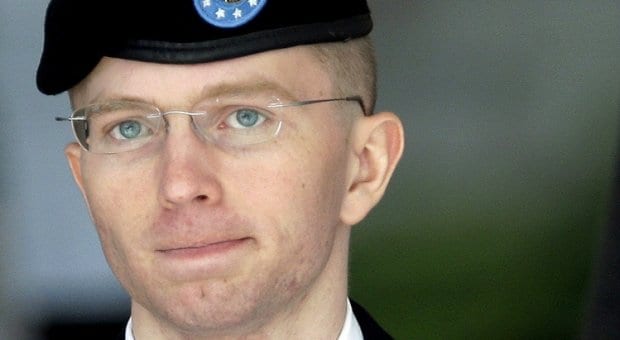The groundbreaking trial of US Army private Bradley Manning is highly complex. Indeed, the soldier who transmitted 750,000 classified military documents to WikiLeaks has a complicated personal history that is nearly impossible to package up for the media to represent in a favourable light.
A great deal of the recent controversy about Manning has pivoted around the inadequate representations of the private’s queer sexual and gender identifications.
On Aug 13, during a road trip from North Carolina to Massachusetts, I attended Manning’s sentencing hearing in Fort Meade, Maryland, alongside the Bradley Manning Support Network (BMSN). I was appalled to observe that it wasn’t Manning’s whistleblower activities on trial; rather, it was their possible transgender identity.
A note on pronouns: I’m using the gender-neutral “they” because it is unclear which pronoun Manning prefers. Though some feminist and trans advocates have insisted on using feminine pronouns and the name “Breanna,” as Manning did in certain contexts, the private has never publicly made a statement about their preferred name, pronouns or gender identity.
It should be noted, however, that their lack of comment on this issue might be a defence team strategy to minimize incarceration time. In fact, one reason Manning’s legal team turned down a jury trial in favour of one with a military judge is likely related to Manning’s open queer identification before lawmakers repealed Don’t Ask, Don’t Tell (DADT) in September 2011.
Furthermore, Manning has been subjected to outrageous programs of solitary confinement, torture and humiliation since their arrest in May 2010. At Quantico base, Manning was purportedly the sole prisoner regularly ordered to strip naked with hands behind their back in “parade rest” position.
The court sessions I witnessed were upsetting because both prosecution and defence teams emphasized how the intelligence analyst’s deviant queerness was responsible for their instable mental health, which allegedly led to the document leakage.
In an age where non-normative gender identity is no longer considered a disorder, where DADT has been razed and even certain American mainstream transgender groups are lobbying for the right to serve their country alongside their cisgender counterparts, it is deeply concerning that Manning’s sexual and gender identification has been linked to negative notions of pathological mental instability, incompetence and malevolence.
Queerness shouldn’t be equated with any of these things — and neither should whistleblowing. The problem is the abusive American military and its self-perpetuating imperialist, homophobic and sexist ideologies that continue to dig it into such a deep hole.
As many LGBT Americans increasingly gain a complete range of legal rights, they are becoming more integrated into nationalistic agendas and belief systems within the framework of what queer scholar and activist Jasbir Puar has called “homonationalism.” The fact that powerful gay rights groups like the Human Rights Campaign and GLAAD have refused to support Manning, all the while aggressively promoting assimilative LGBT participation in the Army, perfectly provides evidence of this type of homonationalism.
While American relationships with Russia deteriorate because Vladimir Putin granted temporary political asylum to National Security Agency whistleblower Edward Snowden, we Americans are bombarded with a host of anti-Russia propaganda. Simultaneously, LGBT communities internationally are casting light upon the horrendous state of gay rights under Putin’s government.
Is this purely a coincidence? Regardless, it is critical to reexamine how we as queers are enveloped in these homonationalist programs. Though I condemn the treatment of LGBT citizens in Russia, I equally condemn the American military’s handling of its queer soldier Bradley Manning.
I sat four rows behind Manning — a mere five-feet-two, 105 pounds and dressed pristinely in uniform. I wore blue-jean cut-offs and dirty Doc Martens and hadn’t showered in three days. To demonstrate my solidarity, I borrowed a black T-shirt with the simple word “Truth” written on it in white. At one point earlier in the trial, these T-shirts had been forbidden on account of how this seemingly benign message might disrupt testimonials.
I’m not certain what “Truth” is supposed to mean. That Manning is innocent and a hero? That they were instrumental in exposing some of the most important truths of the 21st century? That the conduct of the American military has been truly despicable?
Both Manning and I fidgeted and ground our teeth as the sessions stretched on.
What is the truth?
The truth is, queer rights are human rights.
The truth is, I wanted so badly to walk over to Manning and give them a hug and say, “You are so incredibly brave.”
Jackson Davidow is a PhD student in the history, theory and criticism of art program at MIT.

 Why you can trust Xtra
Why you can trust Xtra


